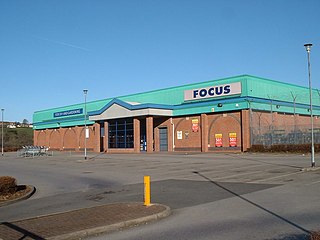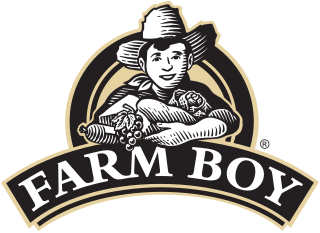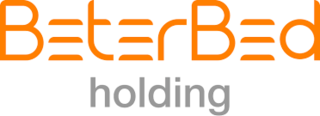
Focus DIY was a privately owned chain of DIY stores in the United Kingdom. It served the consumer DIY market sector, and most stores had some form of garden centre.

Homebase is a British home improvement retailer and garden centre with stores across the United Kingdom and Republic of Ireland. Founded by Sainsbury's and GB-Inno-BM in 1979, the company was owned by Home Retail Group from October 2006, until it was sold to the Australian conglomerate Wesfarmers in January 2016.

Farm Boy Inc. is a Canadian food retailer operating in the province of Ontario. The company is based in Ottawa, Ontario. The retailer specializes in selling fresh produce and food products, with an emphasis on Farm-to-table wholesale.

BAWAG P.S.K. is the fourth largest bank in Austria. It was formed on October 1, 2005 by the merger of the separate banks P.S.K. and BAWAG.

Wickes is a home improvement retailer and garden centre, based in the United Kingdom and owned by the Travis Perkins Group, with more than 230 stores throughout the country. Its main business is the sale of supplies and materials, for homeowners and the building trade.

Karstadt Warenhaus GmbH is a German department store chain whose headquarters are in Essen. Until 30 September 2010 the company was a subsidiary of Arcandor AG and was responsible within the group for the business segment of over-the-counter retail.

Praktiker AG was a German hardware store chain which operated in Europe. It was based in Hamburg and opened its first store in 1978 in Luxembourg under the name bâtiself. Initially owned by ASKO, the chain became a division of Metro AG after the merger of ASKO with Metro Cash & Carry in 1995. It was spun off under the name Praktiker Holding in November 2005 and listed on the Frankfurt Stock Exchange. Since 2006 until 2011 was listed on MDAX and since 2011 until 2013 on SDAX.

Fagor Electrodoméstico was a large domestic and commercial appliance manufacturer based in the Basque Country, Spain and run by the Mondragon Corporation. Fagor was Spain's largest consumer appliance company and the fifth largest electrical appliance company in Europe, manufacturing a wide range of domestic appliances, including washing machines, refrigerators and ovens.

Distribuidora Internacional de Alimentación, S.A. (DIA) is a Spanish multinational hard-discount supermarket chain founded in 1979 which as of 2012 operates 6,914 stores internationally, making it Europe's third largest food sector franchiser. It has also owned Schlecker in Spain and Portugal since 2013.
William Ernest Archer is a British businessman.

A&A Records was a Canadian record store chain. Prior to the expansion of Sam the Record Man in the early 1960s, A&A was the dominant record store chain in Canada. It was acquired by CBS Records after it lost the dominant market position to the Sam's chain, but was reacquired by a Toronto investment group in 1981. A&A Records filed for bankruptcy in 1993, shutting down all stores.
Nakumatt was a Kenyan supermarket chain. "Nakumatt" is an abbreviation for Nakuru Mattress.

Tengelmann Warenhandelsgesellschaft KG, doing business as the Tengelmann Group, is a holding company based in Mülheim an der Ruhr, Germany.
OBI GmbH & Co. Deutschland KG is a German multinational home improvement supplies retailing company. It is headquartered in Wermelskirchen and operates 668 stores in Europe, of which 351 are in Germany.

The REWE Group is a German diversified retail and tourism co-operative group based in Cologne, Germany. The name REWE comes from Revisionsverband der Westkauf-Genossenschaften", meaning "Western Buying Co-operatives Auditing Association". The most important companies under the umbrella of the REWE Group operate under the REWE-Zentral AG and REWE-Zentralfinanz eG names. The basis of the co-operative trade group consists of a network of independent retailers. In the 2017 financial year, the REWE Group had total external sales of €57.8 billion. The REWE Group is the second largest supermarket chain in Germany behind EDEKA.

Bauhaus is a Swiss-headquartered pan-European retail chain offering products for home improvement, gardening, and workshop. The name contains the German words bauen and Haus (house), but also alludes to the modernist Bauhaus school and the company's founder and owner, the German billionaire Heinz-Georg Baus.
The international Essl Social Prize was founded in 2007 by Martin and Gerda Essl, owners of the Austrian home improvement company bauMax. The prize was awarded annually by the Essl Foundation between 2008 and 2012, and once again in 2013/14. It supported projects developed by social entrepreneurs and prize winners were awarded 1,000,000 Euros prize money.

Beter Bed N.V. is a Dutch holding company. Through its subsidiaries Beter Bed Holding N.V. trades in bedroom furniture, mattresses and related products. In this line of business Beter Bed N.V is market leader in the Netherlands and was, until the sale of its subsidiary "Matratzen Concord", also market leader in Germany. Since 5 December 1996 Beter Bed N.V.'s shares have been being traded on the Amsterdam Stock Exchange. However, Beter Bed N.V. did not belong to the group of companies that compose the AEX index but was part of the group that compose the Amsterdam Small Cap Index. On 24 September 2018 it was reported that Beter Bed N.V. had been removed from the Amsterdam Small Cap Index.
Signa Holding GmbH is Austria’s largest privately owned real estate company. Signa was founded in 2000 by the Tyrolean entrepreneur René Benko. Over the years, the two-man company with an initial focus on classic real estate development has become a pan-European real estate group with more than 150 employees and offices in Vienna, Innsbruck, Munich, Düsseldorf, Luxembourg, Zurich, Bolzano, Berlin and Hamburg. The principal focus of the Signa Group of Companies is the long-term investment in real estate in prime city centre locations. Additionally Signa became the biggest owner of malls in Mid Europe with over 46.000 employees.

Lucky's Market is an American supermarket chain started in Boulder, Colorado. Founded in 2003 by Bo and Trish Sharon, the chain focuses primarily on organic food. From 2016 to 2019, the company was partially owned by the Kroger supermarket chain. At its peak in 2019, the company had 39 stores in ten states. The withdrawal of financial support from Kroger at the end of 2019 led to a massive company downsizing to just six surviving stores in four states and a Chapter 11 bankruptcy protection filing in 2020.

















